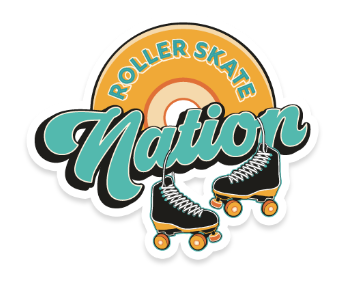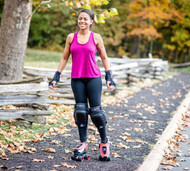Avoid These 6 Skating Mistakes Beginners Make
1. SKIPPING PROTECTIVE GEAR
Mistake: Neglecting to wear proper protective gear, including a helmet,
knee pads, elbow pads, and wrist guards.
Why it’s important:
Falls are inevitable when learning to skate, and protective
gear can prevent serious injuries. Wearing the right gear provides a safety net
and builds confidence while you try new moves or build up speed. Check out our blog post on protective gear to find out what gear you really need.
In addition to protective gear, skate trainers are a great tool to
support kids learning to skate. We also recommend the Slow Roll bearing alternative for skaters of all ages to provide stability while working
on beginner techniques and learning to balance.
2. OVERSPENDING
Mistake: Buying expensive skates before you know what you really want.
Why it's important:
The last thing a beginner wants to do is spend a lot of money on a pair of
skates only to decide they want something different down the road. For example,
you may realize you don't like the feel of a high-top boot and want to switch
to a low-top boot, or prefer a different type of plate. We offer many options
for beginners that balance affordability and quality, so there is no reason to
break the bank on a new pair of skates until you are committed to skating long
term and are ready to make an investment. When that day comes, we have a large
selection of handmade boots using the highest quality leather, skate plates
made from aircraft aluminum, and ceramic bearings. Until then, we have options
under $100, and $150-$250 will get you a very well-made skate that will last a
long time. We also offer big discounts on slightly used skates!
3. NEGLECTING BASIC TECHNIQUES
Mistake: Attempting advanced moves without mastering basic skating
techniques.
Why it’s Important:
Learning the fundamentals, such as proper stance, balance, and stopping techniques, is crucial for building a strong foundation. Skipping these basics is a beginner mistake that can lead to frustration and increase the risk of accidents. Nailing the basics will make you a better skater, and it will be easier to pick up more advanced moves once you have established a solid foundation.
4. IGNORING SKATE MAINTENANCE
Mistake: Neglecting to regularly check and maintain your roller skates.
Why it’s important:
Well-maintained skates perform better and are safer to use. Regularly check for
loose bolts and keep your bearings clean and lubricated. Keeping your parts in
good condition enhances their longevity and ensures a smoother skating
experience. We have all the tools and products you need in our Skate Maintenance Kit. If you’d like more information on how to properly maintain your
roller skates, check out our blog post here.
5. CHOOSING UNSAFE SKATING ENVIRONMENTS
Mistake: Skating in areas with uneven surfaces, heavy
traffic, or other potential hazards.
Why it’s important: Selecting safe and suitable skating environments to practice is crucial for
your well-being. Avoid busy streets, areas with lots of obstacles, and uneven
terrain. Opt for smooth, flat surfaces like skate parks, empty
tennis/basketball courts, or designated roller rinks when practicing.
6. USING THE WRONG WHEELS
Mistake: Skating on wheels that are the wrong durometer (hardness) for the surface you
are skating on.
Why it’s important:
Different skating surfaces, such as indoor
rinks, outdoor pavement, or smooth concrete, have varying levels of hardness.
Softer wheels (lower durometer, eg., 78A) provide better grip and shock
absorption on rough or uneven surfaces, while harder wheels (higher durometer,
eg., 99A) are more suitable for smooth surfaces, allowing for a smoother and
faster ride. Harder wheels generally offer less rolling resistance, allowing
for increased speed. On the other hand, softer wheels provide more traction and
control. We recommend beginners start on a softer wheel (78A-85A),
whether they are skating indoors or outdoors, until they become more comfortable
picking up speed.
By being aware of these common skating mistakes and taking steps to avoid them, beginner roller skaters can enhance their learning experience and reduce the risk of injuries. Always prioritize safety, invest in proper gear, keep those skates well maintained, and gradually progress from basic skills to more advanced maneuvers.


